
SolvED x Teach For India Bengaluru -
Building a Community That Solves Together
Building a Community That Solves Together
SolvED is India’s first marketplace for social innovation in education leadership. To bring a sustainable, systemic change in a complex and dynamic system like India’s education ecosystem, it is essential to work on enabling the leaders.
After a digital pilot of SolvED last year, we got the opportunity to come together to orchestrate an in-person problem solving experience last month. We collaborated with Teach for India Bengaluru, with 40+ fellows wearing the solvers hat for the day. This was an opportunity to work with India’s brightest and most promising young graduates and professionals to solve problems faced by different stakeholders in the education system.
This edition brought together seven organisations to make it a worthwhile experience. Posers (Breakthrough, Involve & Mantra4Change) posed the problem statement and the Knowledge partners (CoLab and Inaglobe) helped us brainstorm ideas, create content like reading materials, asynchronous packets for self learning, and design modules.
This edition of SolvED was aimed at helping fellows understand how to design impactful solutions by applying societal thinking approaches. At the same time, for them to explore their creativity and discover tools for developing innovative ideas. They got introduced to new concepts, design and tools which will help them build a good solution. The team also gave them a SolvED checklist – characteristics of a good solution. With these knowledge, tools and over 2.5 hours, through a hackathon approach, the fellows who work closely with students and teachers, deep dived into solving the problems relevant to their role.

To enable this, we delved deeper into concepts like “Exponential societal change”, “Characteristics of a good solution” which we also called the SolvED checklist (see below).

The session began with a simple prompt – How would you cross the river to reach your students in school on the other side? The next question was: How would you cross this river if you had a phone?
We received a variety of answers for both the question. For the second one, they shared responses like “I would call someone for help”, “I would take the class online” and “I would call to get a boat”.
The interaction then led to the question, Did problem solving get easier using the right tools? Most of them responded, “Yes”.
With this, we introduced what we do at ShikshaLokam and the same analogy was used to link it to problem solving with the right knowledge and tools.

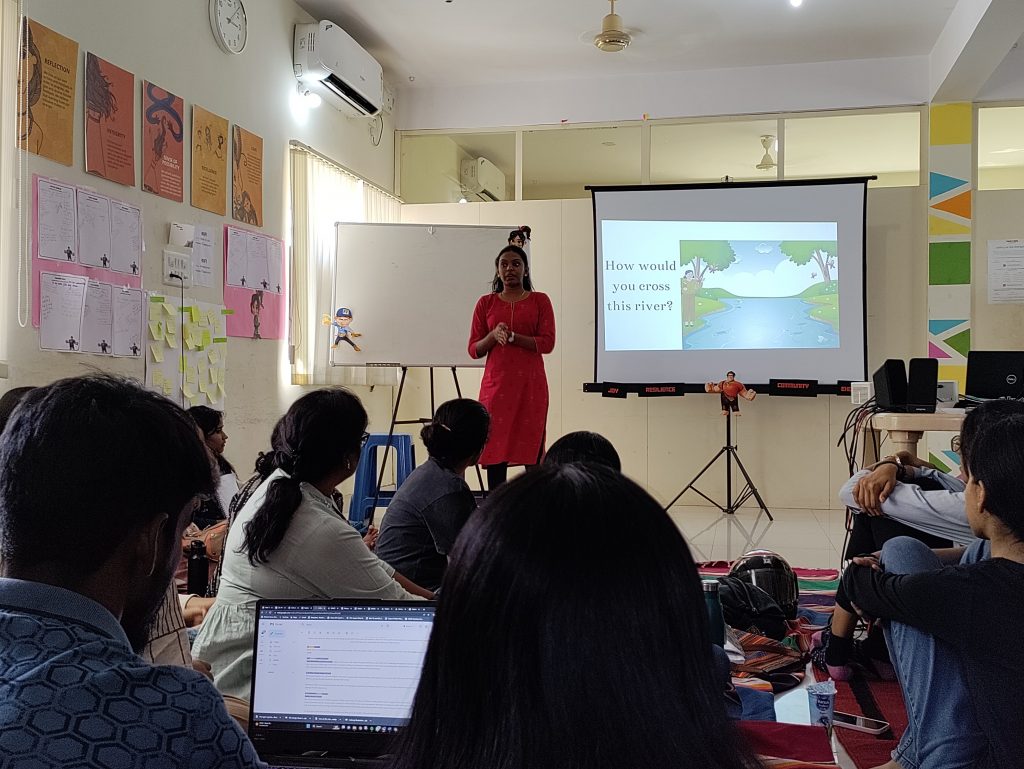
This was followed by Mangalam Gupta, Lead Orchestrator – Societal Thinking, speaking about exponential change and about mindset shifts such as “Diversity is the challenge” to “Diversity is the solution”. He shared how sometimes it is easy to say getting a good solution could be difficult due to diverse minds or people. But the opposite is true – diverse minds help with a variety of ideas, perspectives and thoughts leading to solutions not thought of before, solutions which are sustainable with different perspectives heard and incorporated. This helped the participants understand the need for thinking generic solutions, solutions that will work for scale, rather than scaling what works.

Mangalam Gupta talking about Societal Thinking
Fellows were divided into six groups and each group picked out a problem statement through a chit. They spent the next half of the session brainstorming, discussing and coming up with solutions and ideas to be presented to the Jury.
Our jury consisted of 3 members, Sindhushree, Program Lead – Mantra4Change, Dr. Asha B, Operations Lead – Involve who were also our problem posers and Sanjana DM, Lead, Product Innovations – ShikshaLokam. Sindhu and Dr. Asha also acted as mentors guiding and supporting the groups during the brainstorming session.
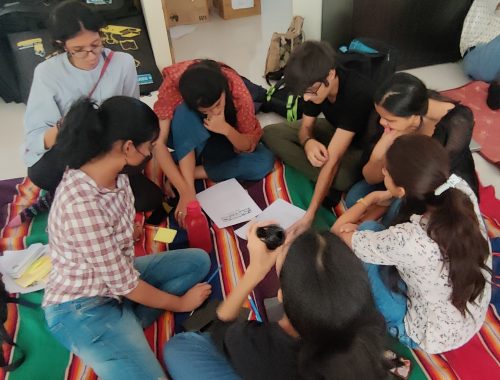

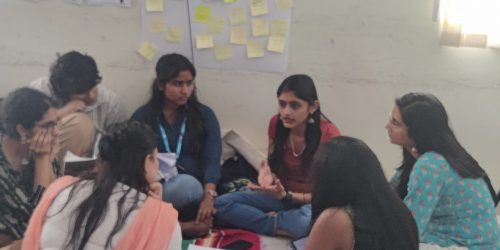

Brainstorming session
Just an hour of discussion triggered captivating ideas and solutions from the fellows for almost all the following problem statements:
- Cluster Resource Persons (CRPs) play a significant role, but there is a growing concern about their reluctance to observe classrooms and provide constructive feedback to teachers. (Mantra4Change)
- Parents are not meaningfully engaged in their child’s learning. (Involve)
- Current education system lacks a gender transformative approach and lens in its curriculum framework and learning approaches, thus reinforcing and reproducing discriminatory norms within the school system. (Breakthrough)
It was heartening to see the fellows design and present the solutions in a short time. They were diverse, relevant and met the criteria. There were solutions like using biometric for establishing accountability for CRPs, creating an app to engage children and their parents with their everyday activities and learning, and the education system adapting a gender transformative approach etc.
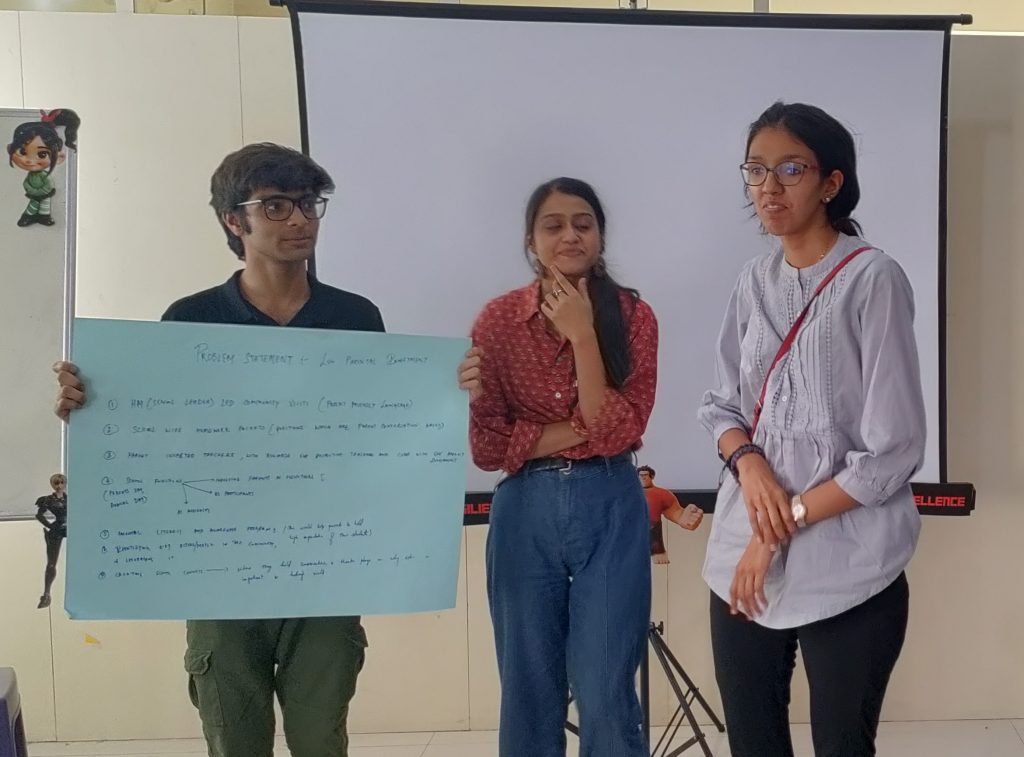
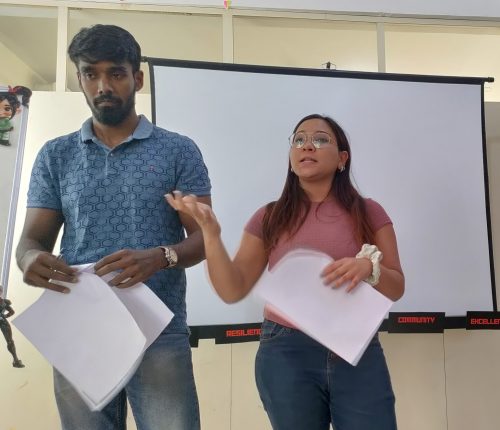
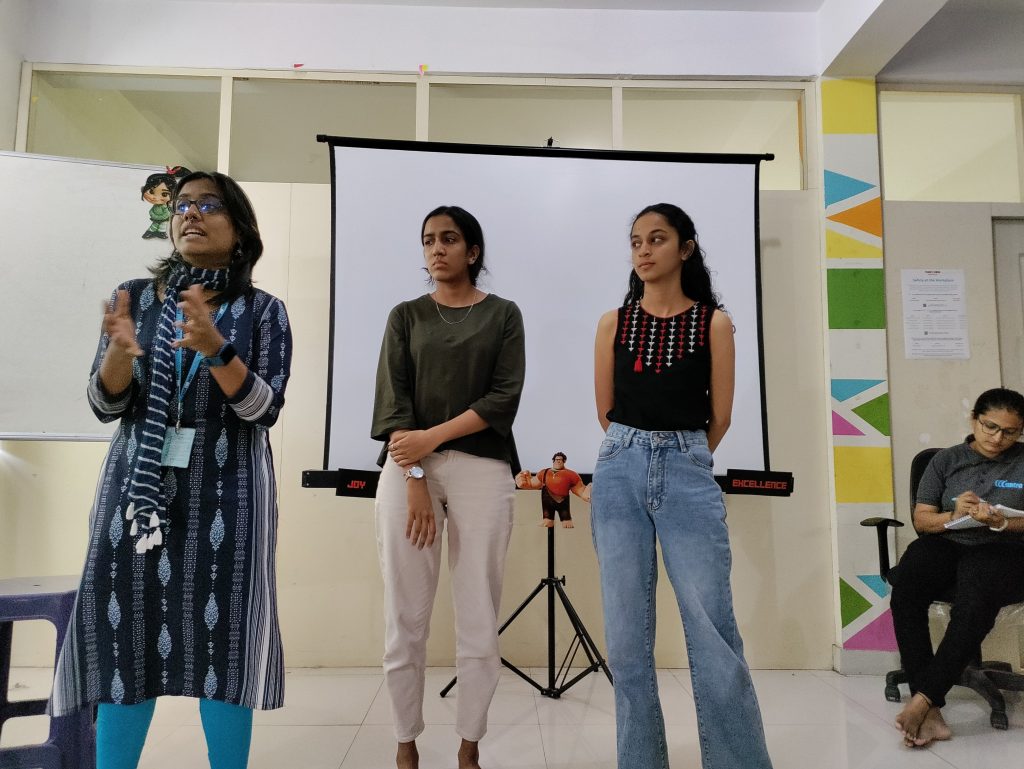
Groups presenting their solutions to the jury
Towards the end, we asked the fellows to share about the SolvED experience by asking them “What is the one word that comes to your mind after this exercise?”
We heard Hopeful, Power of Collective, Passion, Will power and Sense of possibilities. Some of them added, ‘being cognizant of the fact that there are many challenges everyday, we still feel driven to solve or work towards these problems.’ ‘Even though there’s a thought that says it might not be a big impact but something small also will help or benefit one child or a particular group of children.”
These reflections were a testimony that we were able to hit the mark – nurturing problem solving abilities in the education community.
SolvED doesn’t end here! We plan to have other engagements with universities and run another one with the education ecosystem. If you are interested to co-orchestrate the same for your community, write to us at joyeeta@shikshalokam.org!
Meet the Author
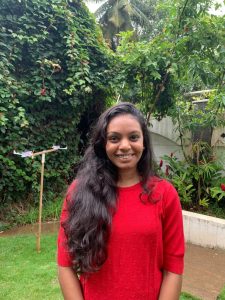
Lydia Johnson
Lydia is a dedicated social worker who is passionate about working with children to make a positive impact. She has also worked with Hope Torch, Spastic Society of India and Teach for India, getting trained and helping others. Her empathetic and compassionate approach has allowed her to build meaningful connections with people, empowering them to achieve their full potential. Lydia’s knack for turning the ordinary into extraordinary has made her a go-to person for spontaneous adventures and epic road trips. From chasing sunrises & sunsets on mountain peaks to seeking hidden gems in bustling cities, she's always up for adventure.

Lydia Johnson
Lydia is a dedicated social worker who is passionate about working with children to make a positive impact. She has also worked with Hope Torch, Spastic Society of India and Teach for India, getting trained and helping others. Her empathetic and compassionate approach has allowed her to build meaningful connections with people, empowering them to achieve their full potential. Lydia’s knack for turning the ordinary into extraordinary has made her a go-to person for spontaneous adventures and epic road trips. From chasing sunrises & sunsets on mountain peaks to seeking hidden gems in bustling cities, she's always up for adventure.

